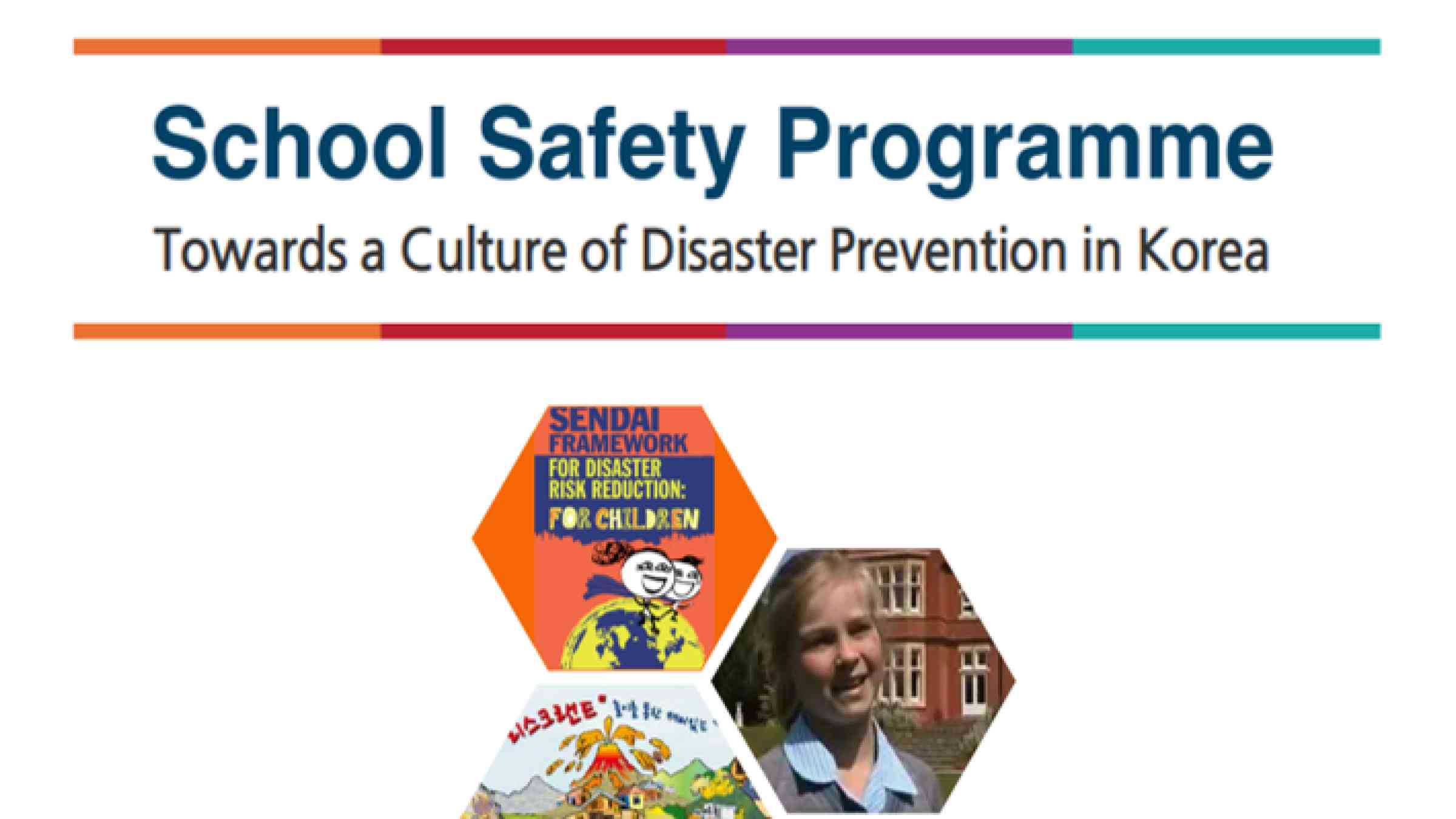Empowering Youth for Resilience through DRR Education: "Korean School Safety Programme"
The School Safety Programme is designed to make prevention-focused DRR education fun and interactive using different types of activities according to the level of audience, including through educational games, videos, and other group activities targeting students in higher grades. The learning lab session will aim to convey this interactive aspect through a diversified programme and means, including practical demonstrations of tools, as well as inclusion of video materials and presentations by countries and cities that have implemented the programme.
The diversity of actors involved in this initiative (from national and local governments, to school officials, international organizations and NGOs), many of whom will take part in this session, will in itself represent an innovative approach to multi-stakeholder partnerships and collaboration towards DRR education and capacity building. The session will demonstrate not the role and experiences of these partners, but also their commitment and leadership, as an inspiring model for other countries and actors.
Learning lab outlined:
Introduction of Korean School Safety Program (5 min):
Introduction of the programme and status of implementation in Korea highlighting outreach for schools in remote areas and students with disabilities (MOIS)
KSSP methodology and tools (30 min)
- Introduction of KSSP pedagogic materials on key DRR Concepts (MOIS)
- Practical application modules/steps of the programme (risk assessment, action planning and sharing) (School Headmaster)
- Tools for students with disabilities and schools in remote area (Korean NGO, TBC)
- Interactive demonstration of educational games (Riskland, Hazard Bingo) (lncheon City)
Learning from the experience of Korea (20 min)
- Integration into official curriculum: Disaster Safety Training for Children (MOIS, TBC)
- Ensuring sustainability: Training instructors and teachers (Korean NGO, TBC)
- Promoting cross-sectoral collaboration: lncheon office of education & local government collaboration (lncheon City) and Ulsan office of education & local government collaboration (Ulsan City)
Learning from global application of KSSP (20 min)
- Case of Nepal (TBC, speaker or video)
- Case of Indonesia (TBC, speaker or video)
- Case of India (TBC, speaker or video)
- Case of Mongolia (TBC, speaker or video)
Way forward, Q&A and familiarization with tools (15 min)
James (Hyun Joon) Jang, Deputy Director of MOIS
Susan (Sung Ah) An, Deputy Director of lncheon Metropolitan City
Ellie (Seong Mi) Do, Manager of lncheon Metropolitan City
Hyoung Woon Kim, Headmaster of Karim Elementary School Seong Yun Cho, Research Fellow of lncheon Institute
Yeong Bae Yoon, Research Fellow of Ulsan Institute
Learn more
This learning lab session will introduce the Korean School Safety Programme and share its approach, methodologies and tools to build capacity of schools and local governments in other countries to design and implement prevention-oriented education programmes in schools aligned with the Sendai Framework for Disaster Risk Reduction and its objectives.
The School Safety Programme: Towards a Culture of Prevention in Korea (KSSP) was launched in 2016 through collaboration between UNDRR ONEA & GETI, the Ministry of the Interior and Safety (MOIS) of the Republic of Korea and lncheon Metropolitan City, with the aim to enhance awareness of disaster risk reduction among young people and to build a culture of disaster prevention through ORR education of school students and teachers. The KSSP has the following objectives:
- To help students and teachers understand the basic concepts of disaster risk reduction.
- To highlight the importance of prevention-focused disaster risk reduction education.
- To explain the role of children and youth to contribute to disaster risk reduction activities.
- To introduce materials and guide educators on how to utilize the related material for explaining disaster risk reduction in the classrooms.
The Programme aims to create an enabling environment where children and youth can:
- Understand disaster risk reduction and become familiar with reduction of disaster risks through playing games, group discussion, and activities.
- Identify hazards and understand when they become a disaster, anticipate frequency, severity, type of possible damages, who is exposed and vulnerable to disasters, and what makes them vulnerable
- Find ways to make them build capacity to be more resilient to disasters by way of prevention, preparedness, and mitigation
The KSSP offers a package of child-friendly, fun-oriented educational materials such as the Riskland Game that are designed to be used by educators to teach children and youth ORR, while encouraging more participation in and raising awareness of child-centered ORR education. The KSSP also offers an overall pedagogic methodology and approach that is universal and versatile that can be easily adapted to any other country or local context. The programme is designed to make school safety education more inclusive in support of the "Leave No One Behind" principle, including through new accessible educational tools for children with disabilities, and to create an enabling environment where students with different experiences of disaster can share learned lessons with each other.
Text BoxSince its start in 2016, the KSSP has reached over 46,000 school students and 3,500 teachers from elementary, middle and high schools in Korea and abroad, and there has been increasing interest from other countries to introduce it in their schools. The programme has already been successfully rolled out in schools in Mongolia, Nepal, Indonesia and India, and this learning lab session will offer an opportunity for other countries in Asia Pacific to explore the programme's contents and methodology, learn how to use and adapt the educational materials for schools, and learn from the experience of countries that have implemented it.

Agenda
Location
Philippine International Convention Center
Online access
Details
Organized by
Ministry of the Interior and Safety (MOIS) lncheon Metropolitan City United Nations Office for Disaster Risk Reduction (UNDRR)Contact
James (Hyun Joon) Jang, Deputy Director of the Ministry of the Interior and Safety (MOIS), Republic of Korea, [email protected], +82 10 5395 8718 7
